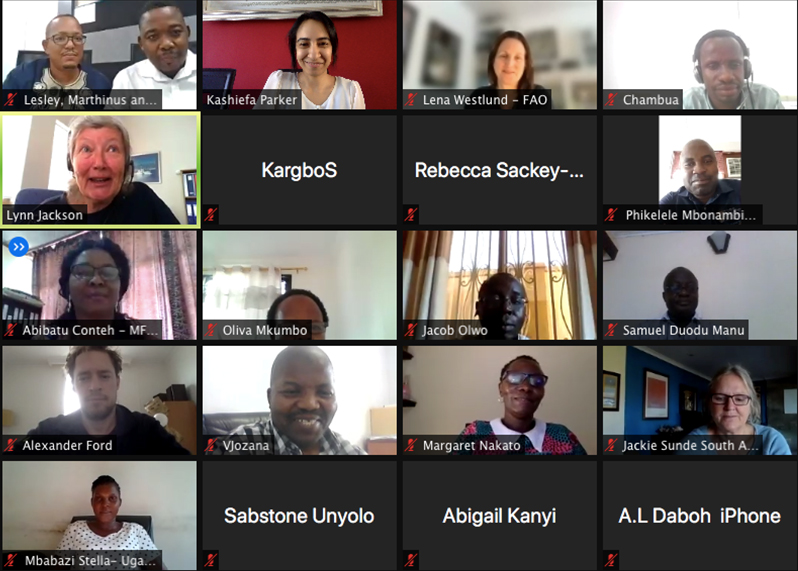International Ocean Institute Southern Africa delivers Regional Small-Scale Fisheries Governance Training for Africa
15/02/2021 - 18/02/2021
Recognizing the challenges many countries face, the ‘Regional Small-scale Fisheries Governance Training for Africa’, aimed to contribute towards creating an enabling environment for the implementation of the SSF Guidelines in securing sustainable small-scale fisheries by capacitating practitioners to address key small-scale fisheries governance issues using holistic and participatory methods. The course, held online on 15-18th February 2021, strengthened capacity by creating increased awareness, promoting cross-sectoral and regional collaboration, facilitating institutional linkages, and developing governance frameworks. Representatives from Ghana, Malawi, Namibia, Sierra Leone, South Africa, Tanzania and Uganda participated in the training event, with participants including mid- to senior level small-scale fisheries officials working within government fisheries departments in their respective countries, as well FAO national SSF project coordinators.
 |
On the first day, each country presented a national small-scale fisheries profile in addition to presentations from the FAO, the International Ocean Institute of Southern Africa (IOI-SA), the University of Cape Town and the World Forum of Fisher Peoples (WFFP), describing the history, contents and implementation of the SSF Guidelines, the complex socio-ecological systems in which small-scale fisheries are situated, as well as giving an overview of global and African small-scale fisheries.
The second day aimed to contextualise the international, regional, and national governance frameworks in which small-scale fisheries sit. This not only helped create awareness and understanding about the regulations around fisheries and its underpinning principles, but also looked at the concept of human and tenure rights, and the legal status of fishworkers. This generated great interest as it informed participants that human rights are dependent on national constitutions recognising rights in their legal systems.
The training then went deeper into linking human and tenure rights more concretely to small-scale fisheries, analysing good governance approaches to small-scale fisheries management that encompasses equality, respect and protection of human rights, participation and inclusivity, representation, accountability, transparency, and integration of local knowledge. These factors were presented by the universities of Cape Town, Rhodes and the Western Cape, as well as a presentation from the International Collective in Support of Fishworkers (ICSF).
Day three took a closer look at understanding small-scale fisheries as complex socio-ecological systems, addressing the intrinsic connectedness of natural, social, political, cultural, traditional and institutional nature of small-scale fisheries. Specifically, issues around gender and gender equality were discussed, as well as community vulnerability and building adaptiveness and resilience in the context of climate change and natural disasters. Additionally, Day Three saw a virtual fieldtrip hosted by Abalobi, where Abalobi presented their unprecedented work in small-scale fishery value chains whilst incorporating values of gender and traditional knowledge.
The following day focused on institutional mechanisms, their interconnectedness, challenges and ability to address issues of small-scale fisheries governance at the regional, national, and local level and the need for coordinated structures and linkages by institutions. For example, a joint presentation from FAO and Duke University explained in detail the importance of data and data collection systems in implementing the SSF Guidelines, referring to the ongoing Illuminating Hidden Harvests study as an example of where data can influence the politics around small-scale fisheries.
Day four included a panel discussion with the Africa Regional Advisory Group of the Global Strategic Framework on the SSF Guidelines (SSF-GSF) and the African Union – Inter-African Bureau for Animal Resources (AU-IBAR). They discussed the responsibilities of implementing the SSF Guidelines across Africa, as well as the role of non-state actor platforms and making a space for the voices of small-scale fishers and fishworkers in Africa.
The fifth and final day of the training looked at the FAO’s ‘National Plan of Action for Small-Scale Fisheries Guidelines Implementation’ (NPOA-SSF) toolkit and the role NPOA-SSF play in improving governance in African small-scale fisheries. The National Task Team for Tanzania’s NPOA-SSF presented lessons learnt and insights emerging from best practice in implementing the SSF Guidelines at national level. Participants also carried out a training exercise using the NPOA-SSF toolkit, including a stakeholder mapping, governance review and gap analysis, as well as the rationale for developing an NPOA-SSF in the national context. The results were presented by each country and discussed and there was keen interest in taking NPOA-SSF processes forward at the national level.
The training was a huge success and very well coordinated by IOI-SA. Aside from presenting on a wide variety of issues around small-scale fisheries, the training also succeeded in providing a forum for an exchange of views and experiences, seeking ways of working more collaboratively across Africa.
